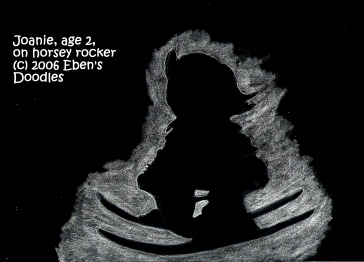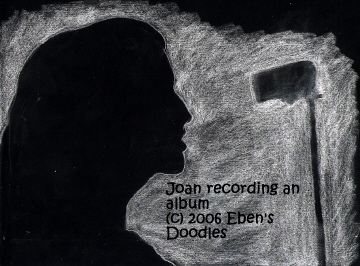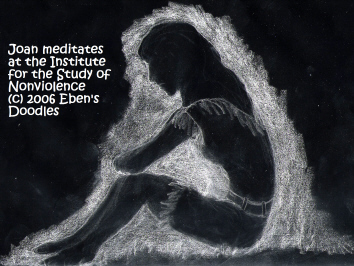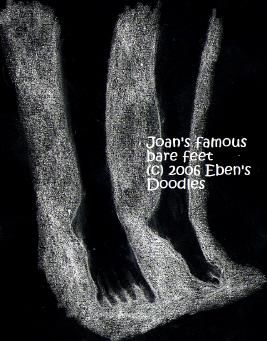
THE EMMAUS WALK PRESENTS:
"Joan Baez, a Silhouette,"
A Review of her "And a Voice to Sing With, A Memoir,"
by Ronald Ginther

This is not an easy review for me as a Christian. I have thrown the MEMOIRS aside more a number of times, after repeatedly encountering the "F" word, and it was not "Faith", sorry to say. The book itself has a customary quotation at the beginning, and it is from that super-clever manipulator of words, e.e. cummings, and it contains politically correct bad language. It is almost as if the Silhouette goes out of her way to paint herself opposite from the darling of her father and mother--she is determined to shatter that childhood image and replace it with one of her own choosing. She succeeds. It is hard to believe the pictures of an idyllic childhood she permits us to see. They don't connect with the reality of the life she chose for herself as a young woman and adult. It is like applying the ringletted Shirley Temple to Godfather-like settings. It jars. It creates a sense of unreality and almost a nightmare. It explains why she has nightmares herself--how can you live in the opposite world you were intended to live in without some disorientation and a sense of being lost in a twilight world?
I have to call her a Silhouette to make some kind of sense of her, not because she is dark-haired and dark-eyed, but because she has created a dark outline of herself, and lived within it all her life--and though it is unreal, it has nevertheless seemed to be a real person to fool herself and most everybody she has known and also gone through many of the experiences of a real person. With this silhouette she has won for herself world-wide fame and a big fortune and been able to meet and mix with the world's famous people. She has won also adulation and acclaim. She has crisscrossed the globe countless times, holding hundreds of concerts that were packed, sold-out, and thunderous in applause when she had finished singing. Her "extraordinary" (her term) life--certainly it was that, but it wasn't really her life--it was something she manufactured--it wasn't really Joan Baez as her Creator designed her to be. That is certain. God created light and ordained His creatures to walk in the light.
Joan Baez created a silhouette, a dark caricature, of that original design, and then proceeded to run from God with it all her life. Maybe she is still running from her original design, still darkening the lines and content of her clever, entertaining, famous silhouette-persona.
She was 47 when her MEMOIR with the "F" words sprinkled across it was published, and though she would be 66 at this time, has she changed? Has she guessed that she has never really lived as God intended? Has she, in other words, refused to come to God in all her vulnerability of a sinful, fallen creature and taken responsibility for her ego-centered, pleasure-seeking life and flight from God?
We all must come to that place before we can begin again, anew, and know genuine, real life. Before that point, we are all puppets, serving a master no one would want to serve, if he were unmasked before our eyes. Unless she has reached that point, she is still dangling her clever, entertaining, famous, fashionable, politically correct silhouette before the eyes of the world, her family, and friends.
Her old friend and one-time singing partner Bob Dylan, a couple years ago, perhaps, wrote a song that has some very haunting lyrics, such as, "You're gonna serve somebody!" No matter what you do in life, rich or poor, crook or saint, short or tall, educated or ignorant, the song goes, you're going to serve one of two masters, the Devil or God--that is the clear, sober message of the striking lyrics, and I have heard Natalie Cole sing it superbly as a daughter of Nat King Cole would sing it.
Has Joan sung this song? Has she paid any attention to these rather spiritual lyrics of her former companion from the "good old days" of the 60s? Let us hope she has--before it really is too late, and Christ is knocking one last time on the door of her heart.
My focus or question underlying this review is: what makes a Joan Baez, the singer-activist icon, the dark silhouette, and not a Lilias Trotter, who was equally, if not more, artistically talented (and rich and well-placed in English society, to boot). How did Joan miss her real calling in life, whatever it may have been? How did she manage to miss it and run from her original design and her God? In the vernacular, what motivated her to "do her own thing'?
Actually, we all possess within us sufficient motivation to do our own thing and flee from God's will all our lives. That motivation is provided by our innate nature of sin, the inescapable Adamic sin nature. "Sin" is a word that explains in its very spelling what sin is. The middle letter "i" gives the meaning away. The original "i" was Satan's--just as there is an "i" in the middle of his heavenly name, Lucifer. Evil was found in him, and it was his self-exalting ego. He envied God what was not his to possess, though God had created him more glorious than the other angels and given his great, unique responsibilities. God's original design of Lucifer was not enough for him, however. He had to improve on it. He put it aside, in fact, and stepped into a silhouette of himself, a darkness that bore only his former outlines. He became darkness itself, and rebelled against God and fought God and his loyal angels. There was war in heaven, with Michael who led God's loyal angels, and Lucifer, turned Satan, was thrown out of heaven to the earth along with the angels Satan had deceived into following him in his mad caper to set himself up above God the Almighty.
This rebellious, self-exalting, envious, murderous "i" began in Lucifer, turned him into God's arch adversary Satan, and that "i" continued on a path of total rebellion despite the destruction and loss it brought to him. He exists now only to take with him to the Lake of Fire, his final home, everyone he can deceive into following him, just to spite God. Spite and revenge are his motivation, his only pleasure. He is pure evil.
The problem with him is that he doesn't appear dark to those he deceives. He is so good at deception that the people who serve him think they are serving good causes and high ideals and improving or liberating oppressed humanity. Joan Baez is credited, on the book's jackets, with "honesty" and "ideals" by the New York Times Book Review and United Press International. That is not surprising, for them to describe her in those terms. Satan has many ideals that attract people to follow him. He could not enlist people to serve him for himself, being an ugly, repulsive mass murderer and frog in reality, so he clothes himself in light, in high ideals, and then people flock to his side by the thousands.
To answer the question, let us look at her beginnings as she relates them.
The cute, little girl who later grew up into the foul-mouthed, folksong-spouting nightengale had a pretty ordinary mom and dad, a sort of off-beat Ozzie and Harriet. Her mom, like Harriet, was a dark-haired, pretty lady, and her dad was dark and handsome. What made them off-beat somewhat, unable to fit the mold of the 1950s model middle class family in which they lived, was the disconnect with a personal God. God, for them, was a deity of causes and issues, and they served him by going to Quaker meetings of the silent, non-violent type.
Her Mom, "Joan Sr.", was born in Edinburgh, Scotland. Her mom's father was a liberal Episcopalian minister who Joan says was "afflicted by various strong women in his life." Joan Sr. was raised in the United States. When later she went to Drew University, she was at a party and there met her husband to be, Albert Baez, a dark and dashing Mexican young man from Puebla, Mexico. Albert's father had left Catholicism to become a Methodist minister. He moved his family to Brooklyn where he went to work for the underprivileged. So here are the makings of a silhouette called Joan Baez, the superstar folk singer and anti-war, peace activist--she was the daughter of a woman-dominated father, liberal in religion (which meant he could identify with causes but not a personal relationship with Jesus Christ, the One he was supposedly serving as a Christian). She patterned herself, evidently after him--never really questioning his course in life.
I can only go on Joan's word about her backgrounds. There is no hint of anything personal about God, regarding the faith of both fathers. They were ministers in Methodist and Episcopalian denominations and churches--but where is Jesus Christ the Savior and Redeemer? He is not even mentioned once by Joan. Where is sin, confession of sin, forgiveness, being born again, salvation, soul-winning, growth in Christian maturity, prayer, getting into God's word, church fellowship based on the Bible? All are missing from Joan's life and vocabulary. There is churchiness, even a love of the forms of worship by Joan, a nostalgia for the services and the many details she lists--but nothing personal about God. God isn't personal to her. She seems never to have glimpsed that aspect about God, nor even wanted it. It almost seems as if the little girl that was Joan so long ago never prayed to God a prayer from her heart. If she did, it has been completely forgotten.
What Joan Jr. found in her religious environment were contemporary, liberal causes of one kind or another. Her father, who graduated from the university and went on to a career (given up later) in the U.S. military, had entertained thoughts of entering the ministry, but didn't, after growing disturbed and conscience-challenged about his lucrative, civilian role serving the military, switching to a job with UNESCO and going on from that to an academic career teaching at Harvard and Stanford, all the while taking up environmental causes and issues.
Joan can painfully honest about personal details--but what is the point of this? She pinched a baby when she was five years old? She had various love affairs? She experienced rage with Japanese interpreters whom she couldn't get to translate her to her satisfaction at benefit concerts? She doesn't add any of this up--to get a perspective on herself--she only throws these detail at the reader, expecting the reader, I guess, to make some sense of them.
For an icon of the nonviolent philosophy in politics, my take has to be that she held inside her a reservoir of violent emotions and had to exert a lot of willpower on occasion to check her impulse to hit people she couldn't manage to her own advantage.
She tells this all candidly--perhaps too candidly. Nevertheless, she seems not really bothered by these short-comings and inconsistencies, and though it bothers her temporarily, she goes on being the beautiful silhouette, stepping away from the nastiness of particular moments of "when she lost control" into nicer scenes were things go more her way once again.
This appears to be her penchant for William Clinton-like "compartmentalism", which strong-willed, unregenerate individuals are known to practice, as it enables them to step into a new set of clothes and go on, closing the door on each of their escapades, and forgetting the jarring moments when they are shown the disparity between their lives and personalities as lived and what they are ostensibly championing as ideal and worthy pursuits and goals.
Now if Mother Theresa actually was an uncaring, loveless, rage-filled person, who was supporting only political causes--wouldn't she be a hypocrite? Wouldn't she be called a fraud, when (and it would be only when, not if) her true self hidden behind the screen, the exterior persona, showed itself to the world? Yes, she would. But Mother Theresa did not have a hidden self that needed to be kept out of sight and had to be suppressed. Joan Baez did, according to her own account. She suppressed it ("sublimated it", she says). I know from experience that strong people "sublimate" a lot of such feelings.
They don't deal with them, they just shove them under and slam down the lid--BANG!. That is their method of problem-solving. It doesn't work, in the long run, unfortunately. It usually makes a person sick in the stomach, gives them ulcers eventually, from the witches brew of ugly feelings stewing away down deep inside their beings--and sure enough, Joan got sick, and it was her stomach, she thought.
After some miserable meetings with "strange" people and officials, she even started retching in her hotel room, her companions holding her hands and keeping a an emptied flower pot hand. This upsetting tour in Japan, where a mistranslating interpreter was a chief culprit in her eyes was, as she later points out, not her fault at all--it was the CIA's, which had made various threats and forced her translator to not give any political statements she might make and instead substituted innocuous statements of his own. This could very well be the case--as she was defying the U.S. administration at the time, taking her anti-war stance--but the stomach upsets? They were caused by her own internal turmoil.
Maybe I am beating the drum too much here, but it doesn't matter now whether the CIA was behind her strange, disturbing disconnect with the Japanese and her stomach problems, or she has just misconstrued what happened. She was, before all that happened, essentially disconnected from herself and her Creator, the God she never knew personally. That is the divorce with reality that should have disturbed her more than anything she experienced dealing with Japanese. But she had her friends, family, and career--so, like the compartentalizing William Clinton, she put the Japanese disconnect behind her, and went on...oh, she went on!
"Joanie" would write letters to her "dear Mummy" that you couldn't believe a mother would get from a loving daughter--obscene, self-centered, everything either pleasing her or not pleasing her--it was a world that revolved around this one "big huge" "i" that was Joan the Silhouette. Of course, she was a big talent, with eyes on her everywhere she went--but there have been other big talents in the world before her, and they didn't all act like Joan Baez or think everything centered on them and their desires, thoughts, feelings, and career. The other big names had some idea of modesty and humility that checked this kind of solipsistic megalomania. To be fair to her, Joan Baez evidences a measure of humility--this gift of hers, she says, is a gift she doesn't credit herself with, it isn't something she has created and she is very grateful. Just the same, she doesn't give God a shred of credit, she instead quotes Tagore, an Eastern mystic poet: "God respects me when I work. He loves me when I sing." Ah, dear Joan, pardon me, but that is nice-sounding, but it is baloney. There is no such God as Tagore is rhapsodizing about. The quote is poetic, but untrue, unreal. It says more about you than anything else. And God, the God of the Bible which you state you don't believe much of, is not pleased by performances of any kind. Talent doesn't impress him in the least, however great yours happens to be. What matters to him is a person's heart, and the condition of it, right or wrong, cleansed or uncleansed, redeemed or unredeemed, regenerated or unregenerated. He wants a true, sincere heart in fellowship with him, not an impressive Silhouette going its own way.
What the public saw was this dark-haired, bare-footed, "down-home" folk singer who starred in whatever place she cared to performed in, drawing crowds that paid top dollar for the privilege of hearing their queen of the folksinging, glamorous, Woodstockian lifestyle.
The folksinger and icon of the youth culture of the 1960s, Bob Dylan, was her male counterpart in her salad days. It is interesting to see, through her eyes, what she experienced with him and in his company, but it is also sickening. I don't have the stomach to take her flood of self-centered reminiscences, vulgarity, and profanity. She thinks it is all so "cool," and uses that term about things she has sorted out according to her value system, which is one based on her "i" and her chosen assortment of worthy social causes and issues.
Now Joan Baez was aware of the "underprivileged" from an early age--which was not a bad trait. She may have caught this from her father, whose own father was involved in work dealing with the underprivileged in Brooklyn. Giving up a high pay job serving the military, her dad moved the family to Baghdad to work for UNESCO. She got to see, at a tender age, huge social problems of death, disease, starvation, and more death and disease, in fact, than any Unesco office could handle. She nearly died there, catching one disease after another in the microbe-rich Middle Eastern environment. She had developed during her sojourn in Baghdad some "deep social concerns," which survived to fuel her as one of the major figures of the 60's civil rights movement and sexual revolution. At least, that is what is indicated. If she hadn't experienced the slums of Baghdad, she might have still gone on to play such a role. Baghdad just strengthened whatever it was in her that motivated such a course.
With such a burning feeling for the oppressed, why not a missionary's calling? Of course, that wasn't likely to happen. She did not know God personally and never, never spends one sentence on Jesus Christ in her entire autobiography. If she could have ever stopped once in her lifetime to give Jesus five minutes of her time, there might be a Savior or Lord for her instead of the silly grandfather image she likes to cultivate and fancies that she serves with her singing and activism.
When Jesus is mentioned once, it is only for laughing at Bob Dylan's expense for turning his life over to Jesus, not because she respects either Jesus or Bob Dylan anymore. That reveals her scorn and a hard heart full of it.
In the utter absence of Jesus Christ and His salvation, she knew religionism, in the form of "Quaker Meeting," Quakerist causes, and non-violence. God did not really enter into her life, just because she attended a so-called Christian assembly of the Quakers with her parents. She wasn't bound by that church, by any means. She could enter other worlds, comletely opposite to the one the silent Quakers knew. She had her wonderful voice, great technical mastery of folk singing, an expert's eye for how to work with any audience, and added to all that her activism that won her media coverage everywhere, and many influential friends in high places, all of which had catapulted her onto the world's stage, performing with the greats of folk and rock music and also taking front-line leadership alongside world-class political and social leaders. Headline-catching issues were her favorite pet causes, wherever she chose to give her name and reputation to some issue-based gathering or concert.
So far, Joan Baez has turned out to be a sweet daughter of a sweet couple that almost, but not quite, became carbon copies of Ozzie and Harriet. Then, strangely, the disconnect with God kicked in, and she moved farther and farther away from the model mainstream American life (which the Baez's never quite connected with) and entered the world of big-time concerteering, love affairs that included both sexes, civil rights demonstrations, anti-war sit-ins, refusal to pay taxes, trips to support the North Vietnamese regime against the U.S. who was wrongfully, to her opinion, making war in South Vietnam--and then, entering the older generation of the "After Forty Something", shedding the youthful long hair and bare feet folk singer image, turning back somewhat toward the attractive, conventional girl she had left behind.
On the book's front cover Joan is looking totally different from the icon of the 1960's social revolution in the U.S. Her hair is pageboy short and styled casually, but her lipstick is put on just right, and she is wearing stylish jewelry, quite a lot of it, and she is smiling boldly and self-assured, full face, against the world she still believes is fascinated with Joan Baez, Silhouette Errant.
She has had a son by David Harris the draft-resistor, raised him to a young man by the time this book is published, and is living the single soccer mom lifestyle after a divorce and some brief love affairs that weren't meant to be serious and committed, as she says, because they don't leave her with any real, deep regrets. Apparently, she is still living her life quite as she pleases, and her son seems not to be any real concern or trouble. Isn't that nice? With sufficient money and a beautiful home and friends and entertaining trips here and there, life is good to Joan Baez, though, even though her professional salad days are over, and her new look is not so fascinating and appealing to the youth culture (which at the book's printing had turned to Prince and Madonna and Eminem). Though she is well aware that she is aging and now facing a somewhat uncertain future as far as her singing, activist career goes, she is going out with style.
But she hasn't failed yet to find a paying audience, and why should she be gloomy about her prospects? She isn't. She still has her marvelous, once a century voice. Despite all the late partying and the wear and tear of international travel for concert gigs, she has her better than average looks, and is trim and appealing in figure as well. She is still attractive as a woman, she knows, and can have about any man she wants to share her life, though it will probably be temporary, a momentary amusement, on her part and by her choice. She obviously likes the freedom and lack of any binding commitments of a single life.
She has met President Carter in the White House, she has known personally most of the musical greats, and, frosting on her cake, walked alongside the immortal civil rights leader, Martin Luther King Jr. She is known internationally and does Live Aid concerts with Ozzie Osbourne and the Four Tops in the 80s to the next generation, who seem to like her too. She says nice things to them for coming to support a concert for the sake of the poor and downtrodden masses, and then sings "Amazing Grace." It seems to go over well, but did she take it to heart?
U2 performing in England captivates her as she goes to her hotel room afterwards and crashes with the TV going. U2, while doing his thing, pulls some poor, little fan out of the audience and manhandles her around the stage, letting her go and then grabbing somebody else. This display of sex fascinates her--and she can't help but be drawn to U2 and his sweaty lovemaking right on stage before the awed audience of tens of thousands of fans.
She is still using the "F" word in describing U2, as if it is no problem for her--she is "liberated" enough not to care what her readers might feel when she comes out with obscenities.
She describes in tremendous detail her whole experience behind the stage, so to speak, behind her Live Aid appearances. Her mom and dad are in contact with her, and they urge her to do the finale that organizers are asking her to do and Bob Dylan refused. She calls this kind of concert a "time of sharing" and a "circus." Which is it? Apparently, she can take both in the same container. It is a wild circus life she lives, truly, as she describes it so well. What does it mean? She is very happy, she says, in the book's last pages. She is still totally engrossed with this strangely paired marriage of liberal causes and "deep concerns" with the wild, Woodstocking life style she has never entirely given up. She began as a darling of the 1960s and 1970s folk and rock stars and has never really given her heart to any other era. Why? She could call her own shots--being as great as she was--and she is accustomed to calling her own shots, so why give it up?
All the temptations of this passing, worldly life are mere amusements she can take or leave as she chooses--it is HER life, and she is going on, playing the carefree, summertime-grasshopper and Silhouette, for all it is worth.
Forget about winter coming. It's still nice and warm, and the grass is lush green where she is hopping about. It will always be green, with the sun shining, and the birds singing just for her--right?
In the book's last (but not concluding) chapter, she describes being with her dad and mom, who are said to have separated ten years before. Her father, whom she admires very much still, is the consummate liberal, and is ecologically-minded, and still attends Quaker Meeting. He is retired and lives in a hut of sorts in a duckweedy marsh, surrounded by ducks and frogs, and is visited by many people who knew him from his years of teaching at Harvard and Stanford and the time he worked for UNESCO in Baghdad. In his presence, Joan the Silhouette adopts language that puts her back into daddy's lap as a little girl, adoring him as she turns her chubby, smiling face up into his. It is so sweet-- but so alien and divided from her persona of the page or two before this scene--that it does not fit at all. But does Joan the Silhouette note that? Probably not. She has grown so accustomed to her lifelong compartmentalism, apparently, and probably wouldn't care if other people see her as a strange, contradictory, schizophrenic personality.
As she did in the first pages, she zeroes in on the details, details, details, as if she were plunging into a picture she were painting, becoming part of the scene and leaving the real world behind. It is also like she were using a microscope on her father, his home and surroundings. She regrets that the world does not appreciate her father enough. He is deeply, sincerely grieved at the rape of the Amazon's forests. How can the world write such a wonderful, caring man off? It bothers her, but...she moves on. There isn't any tragedy here--he's just somewhat unappreciated, that's all.
She returns home, to her rustic house with the word processor standing conspicuously out amongst the rustic decor she prefers. She is still involved with peace groups, and stands up for Bishop Tutu. Her son Gabe can swear like his mother. She does good social things for Humanitas, and she chats with her Mom on the phone often during the week. Her mom is still mothering her when she needs "strength and comfort." She has a lady friend too, sort of counsellor-confident-nurse-psychiatrist wrapped into one, who uses hypnosis, common sense, and medical know-how to deal with Joan's attacks of depressed moods or emotional problems.
She works against the Contras in Central America and writes group letters against human rights abuses the Contras are said to be committing there. She hangs out with a select crowd at Carmel, and has fun times with dancing and drinking buddies at an 1880s era bar, Joan says.
At the book's end, in the epilogue, she says she will soon be taking a fabulous dream trip. In two weeks she and her son Gabe will fly off to Paris, to spend some fairytale days partying in a real castle at Canisy, Normandy. There will be "champagne and wine and Calvadoes" all night long, fires in the fireplaces, and "every bedroom will be filled."--filled with what and doing what, by the way? She doesn't say, and I don't want to know.
When she and Gabe get back home, "Mom will have a fire going in the kitchen and perhaps a Brahms trio on the stereo. Gabe will fall into bed, and I will sit in front of the fire, dressed like a Spanish princess, telling Mom how the sun rose, piercing through the mist over the lake as I watched in absolute silence from the immense bedroom window, and how there was peace all around as the castle finally slept." Isn't that yet another alluring, Baesque painting of her life?
Life is still sweetly "unnormal", as she prefers it, and with all kinds of amusements to enjoy and discard when she is through with them, with no end in sight yet, for someone like Joan the Silhouette.
But what happens when it all crashes? When the paradise she loves to demonstrate and sing and picket for materializes into an unending nightmare? What happens when a pin finally pricks the party balloon she has been riding since she first caught the world's attention with her phenomenal voice?
Could it be she doesn't get it--she doesn't get the meaning of life at all?
Nobody she names as her helpers with the book can influence her spiritually the right way. The reason they can't help her back to reality is simple. Mom and Dad, all her friends, all her acquaintances, all her adoring masses of millions of fans, past and present, arms joined as they sing "Blowin' in the Wind," they're walking the same downward, slippery, broad slope that leads...yes, the Bible she won't read says...leads to a vast lake.
Now this is a very strange lake the Bible book of Revelation describes in Baez-like detail. It shines too bright and even at a distance feels way too hot to be water. But everyone the Silhouette knows is walking that way. She is having too much fun to turn back or change her mind and change course. What other life is there she could want anyway? So she keeps walking...walking toward the big, bright, hot lake, singing superbly as ever as she keeps walking with all her friends, lovers, drinking buddies at the 1880s-era bar, and, of course, dear, old, old Mom and Dad...but before they even reach it, strange creatures, looking like devils because they are real devils, come out to drag them the rest of the way.
The conclusion is missing from her book, but here it is: you can avoid reality all your life--if you choose like the Silhouette chose--but reality will find you in the end, and then you will pay the full price for running away from the truth.
"...in the end there is the inescapable feeling that we've spent time with an actual human being...we are moved by the experience."--Washington Post Book World blurb on the book's cover.

A comparison:
The book reviewers of the Washington Post Book World would not know a real person, as their observation tell me they have missed it by a mile. A real person was Lilias Trotter, not Joan Baez. With rich parents of high social standing, an exquisite mansion in the heart of London...Lilias was indeed born with a silver spoon in her mouth, so to speak, but she wasn't content to just sympathize and give money and condescend to visiting the underprivileged, but she gave up her life of affluence and comfort and front row seating in London's glittering social whirl to actually go and live among the dirty, poor, ignorant, and spiritually needy people of Algeria, in conditions that more than equaled what appalled Joan whenever she paused in her busy career to remember smelly, impoverished, disease-riddled old Baghdad.
Unlike Joan, Lilias knew a personal God from a young age, and hungered and thirsted for more of Him. She wasn't content with serving social causes. She shared Christ the Savior with all she could get to listen to her, because she wanted them to have a redeemed, liberated life and enjoy eternal life with God in heaven. Like Joan she was also exceptionally gifted, artistically.
Unlike Joan, she had a great intellect. With her intelligence, she could have gone to any university today and excelled. And with the gift of painting she had back in her times, she could have carved out a most distinguished career in the world of art, according to John Ruskin, one of the greatest art authorities from the Victorian Era in Great Britain, known by reputation across the civilized world. He had known many aspiring painters, and put her at the top of them all in ability. Yet, unlike Joan, she turned aside from this sure success in the world of art, this sure fame and fortune and career, to be a missionary to the most neglected, least desirable society on earth--the slums of Moslem Algiers, Algeria. She buried her star, in other words, in obscurity. And she did the impossible. She created a mission field from scratch against impossible odds of hostile Moslem resistance and wave after wave of persecution. She made a mark on the souls of the Algerians that nothing that followed could ever wipe away completely.
Unlike Joan, she moved always against the tide--and she walked, faithfully, in sickness (often) and in health (rarely) onward to the bright city, shining in the distance. She was not walking alone, it is true, but walking step by painful step for no real earthly reward but the joy of hearing her Savior and Lord say to her, "Well done, good and faithful servant!"--and even before she reached the bright, heavenly city, angels, not Joan's hideous devils, came out rejoicing and singing to greet her.
Two different women, two contrary paths, two utterly opposite destinations, two conflicting choices, one real life worth living and concluding in joy, contrasting sharply with one self-centered, self-indulging Silhouette--the Joan Baez who tragically never (at least until age 47) reached out for the real life that only the Lord Jesus could give her.
"A Song for the Dark Lady," by Ronald Ginther

I Childhood--
1940-
Rockin' on Joanie's horse,
Her Pop and Mom her joy,
A horsey was her toy--
Joanie out-smiled any boy!
rockin'...rockin'...rockin...

II Youth
1952-
Singin' brought her fame,
and then she toured the world,
her banner--Peace!--unfurled,
hair, bangs, uncurled.
singin'...singin'...singin'...

III Midlife
1987-
Hair short, she raised a son.
There's Someone at the door who's waitin'.
The inside latch not yet releasin'.
Hear that gentle, faithful knockin'?
knockin'...knockin'...knockin'...

IV Latter Years
2006-
Has she heard the Answer in the wind?
Is she still out travelin' and folk singin'?
Is she still out war and nuke protestin'?
There's Someone at the door who's sighin'.
sighin'...sighin'...sighin'...

Epilogue
Even feet of steel can't last.
She's done her draft resistin',
and done her meditatin',
but every soul needs restin',
restin'...restin'...restin'...

Jesus said: "Come unto Me all you who labor, and I will give you rest."
The Emmaus Walk Home Page
Copyright (c) 2006, Butterfly Productions, All Rights Reserved

YOU ARE CORDIALLY INVITED TO REPRINT THIS ARTICLE ALONG WITH THE LILIAS TROTTER COMPANION ARTICLE FOR YOUR FRIENDS AND CLASSMATES WHO KNOW THE LEGENDARY JOAN BAEZ AND PROBABLY HAVE NEVER HEARD OF LILIAS TROTTER (BUT SHOULD). --AUTHOR